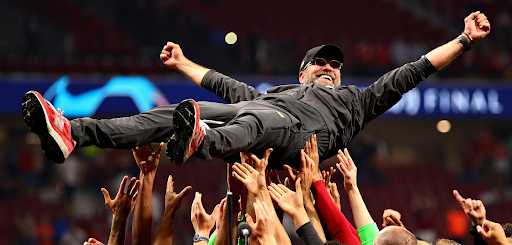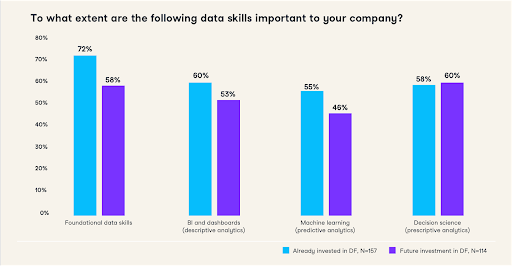What is 21st Century Leadership? The New Skills Every Manager Needs and How to Develop Them Fast
The 21st-century is characterized by constant disruption. Business markets are volatile. The end customer’s behavior is uncertain.
The way people buy and sell is facing a seismic shift.
On top of this, technological advancement has never been as exponential as it has in the 21st century. Selling techniques are democratized, consumers are empowered, and globalization innovates how business is conducted.
It’s up to you as a business leader to face these changes head-on. Yet with business environments becoming more complex, your leadership style requires a makeover.
We’re using the term 21st-century leadership to cover the leadership and management skills you require to succeed against this modern-day backdrop.
What is 21st-century leadership?
21st-century leadership is how managers and leaders adopt a modern mindset so that they’re equipped to deal with the unique challenges of the 21st century. This theory draws upon leadership behavior, skills, and qualities that can only be garnered and adopted through careful study and training.
These skills will allow leaders and managers to adopt a leadership style that is necessary when facing the leadership challenges of today. In effect, 21st-century leadership is different from anything that managers have faced before.
Even before the pandemic, Gartner Analyst Mark P McDonald noted that 21st-century leaders must be artists; they must have an ability to adapt rapidly in a world of work where a talent to ‘relate, create, and instigate change’ defines overall success.
Based on this observation, 21st-century leadership is therefore rooted in the ability to:
- Relate: Leaders need to make a shift from production-based management to people-centric management, relating with teams to better drive performance.
- Create: Leaders need to create new ways of working and introduce new processes that redefine standards and generate strategies that work today.
- Instigate Change: Leaders need to be at the forefront of change, actively introducing and using new processes and motivating teams to accept change.
How do leaders apply these three areas?
Overall, it’s clear that these areas of 21st-century leadership are rooted in agility:
- Improving the agility of leaders and managers.
- Improving the agility of the team.
21st century leadership = agility
In the face of multiple emerging leadership and management challenges, agility is the cornerstone of 21st-century leadership. In short, being flexible, open to change, and reactive.
‘Agile’ is a concept borrowed from software engineering and design. Meaning, an agile approach allows leaders to adapt quickly to different work personality types and different situations.
And, perhaps most importantly, it allows them to adapt quickly. The need for organizations to embrace the agile methodology has been growing for many years. A PwC report from 2016 showed that more than half of all young leaders believed, even back then, that their priority should be developing an adaptable team.
But what agile and adaptable skills are needed by leaders to succeed not only in the 21st century but also in a world impacted by the pandemic?
21st-century management and leadership skills for agile teams
Here are the five most important skills for leadership today:
1. Connected leadership capability
Today’s leaders are faced with increasingly fluid workforces and an accelerating pace of change. The COVID-19 pandemic has wreaked havoc on the global economy, creating challenging environments and complexity for leaders.
Command-driven leadership is no longer effective. Instead, managers need to foster connections within their teams to drive collaboration and communication, pushing everyone towards a common goal.
Training Journal suggests that today’s leaders must:
- Adopt an emotionally intelligent mindset in order to mobilize.
- Focus and renew the collective energy of others while also nurturing a sense of meaning that exists beyond money.
In short, connected leaders communicate value. They inspire others to go the extra mile and bring greater meaning and purpose to the workforce. As Krauthammer consultant Fotigui Camara puts it,
“Leadership is all about engaging and motivating others.”
As a leader, your goal is to connect the dots. In other words,
- Nurture inter-team collaboration
- Foster innovation
- Create resilience
This mindset of connection and positive business acumen will connect your team to your organizational goals in a way that feels organic and seamless.
Learn how to do this in Krauthammer’s Engaging Leadership program.
2. Capacity building

Jurgen Klopp Best Men's Coach Award
McKinsey notes that capacity building is a critically important area that leaders need to address today. They place a firm focus on boosting three key aspects:
- Mindset
- Knowledge
- Overall talent
Think of yourself akin to a great leader like Jurgen Klopp – Liverpool’s football coach.
Does he shout commands at his players during a game? Or does he train them to make decisions for themselves on the pitch?
If a player misses a shot, does he get angry the ball didn’t go in? Or does he praise the pass and shot, making sure next time they score?

"Massive commercial growth off the pitch with Klopp as manager" (Offthepitch)
Leaders must, “praise the effort to motivate the result” (Fotigui Camara). It’s about being a coach rather than a commander, training your workforce with the tools they need to drive their own performance.
Capacity building in the 21-st century is a shift from more direct production-focused management strategies of the past. Instead, a great 21st-century leader will leverage their team’s skills to unleash the full potential and passion of each individual.
Empower your team and hone your leadership skills in Krauthammer’s programme Leadership in a complex world.
3. Data analysis

Key actions to successfully build data fluency
As leaders shift from ‘hard’ management to a ‘soft’ leadership style, PwC believes that an ability to measure and track people’s metrics will prove to be one of the most important skills of 21st-century leadership.
Especially at a time when many businesses must achieve more with less, workforce performance is anticipated to become even more critical in a post-2020 world than ever before.
For managers leading the workforce of tomorrow, adopting a data-first architecture in the organization means having the skills to:
- Collect data
- Analyze data
- Use customer data to optimize performance in real-time
In short, it’s about first adopting a data-first mindset, and then investing in the right training and skills to deploy this across your team.
But don’t forget that data is one thing, but keeping the customer at the forefront of all your decisions is another. On the other side of the data coin is always the customer, client, or overall consumer – their needs, desires, and motivations should supplant your data analysis.
Build your business out by keeping the customer in mind with Krauthammer’s programme on building a customer-centric organization.
4. Effective from a distance

Remote working became the norm during the height of the pandemic. Even with many organizations returning to greater levels of normality, the trend for remote working is showing little sign of returning to where it was previously.
This means, as a leader, you need to be able to make an impact from a distance. You can no longer micromanage your dispersed teams – delegating is your absolute best friend here.
For example, all roads lead to Rome, don’t they? Rome may be your end goal. But while you can decide you want to go to Rome, let your team decide how to get there.
This is how you can create buy-in for your ultimate decision. Which can be a difficult mindset to adopt, especially for new leaders who know all roads lead to Rome and want to get there as efficiently as possible.
What you need is to change your behavior and:
- Trust your team to work independently
- Cultivate a culture of mutual respect
- Be positive about your own success
Without the ability to build and nurture trust in remote teams, the promise that this method of working offers will fail to materialize.
Build a trusted remote team with Krauthammer’s programme on Managing your remote sales team.
5. Self-development
Perhaps one of the most difficult leadership skills you need to master in the 21st century is the ability to shift your focus from your team to yourself.
A leader’s capability is often reflected in the performance of their team, so it’s natural to want to focus on the workforce.
However, self-development skills are becoming increasingly vital for managers whose teams expect them to lead by example.
In today’s climate, you need to prioritize your own development and put yourself first, before developing your team.
Develop your 21st-century leadership skills today
Many of today’s leaders don’t yet possess the skills we’ve outlined above. But it’s often not your fault. In fact, Deloitte found that, in many cases, it’s the organization itself that was proving to be the biggest obstacle to skill-building.
‘Our research shows that while organizations expect new leadership capabilities, they are still largely promoting traditional models and mindsets when they should be developing skills and measuring leadership in ways that help leaders effectively navigate greater ambiguity, take charge of rapid change, and engage with external and internal stakeholders.’
This shows a clear gap between what organizations need to be doing to support 21st-century leaders, and what’s actually happening.
To date, developing essential skills when moving into a new position has often been achieved through simple observation: From understanding the approach of the former leader, and mimicking that tried-and-tested style.
Today, however, the business landscape is shifting too rapidly, especially in light of the pandemic. What worked yesterday isn’t going to cut it today.
For all you 21st-century leaders, you need to adopt agility in your own approach to leadership and management, be active, and seek out opportunities that will enable you and your team to grow and develop.

